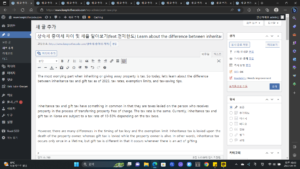The most worrying part when inheriting or giving away property is tax. So today, let’s learn about the difference between inheritance tax and gift tax as of 2023, tax rates, exemption limits, and tax-saving tips.

Inheritance tax and gift tax have something in common in that they are taxes levied on the person who receives property in the process of transferring property free of charge. The tax rate is the same. Currently, inheritance tax and gift tax in Korea are subject to a tax rate of 10-50% depending on the tax base.
However, there are many differences in the timing of tax levy and the exemption limit. Inheritance tax is levied upon the death of the property owner, whereas gift tax is levied while the property owner is alive. In other words, inheritance tax occurs only once in a lifetime, but gift tax is different in that it occurs whenever there is an act of gifting.
Go to Inheritance Tax Calculator
There is also a difference in the exemption limit that reduces tax when calculating inheritance tax and gift tax. Learn more about inheritance tax and gift tax exemption limits.
Inheritance tax exemption limit
Basic deduction: KRW 200 million
Personal deduction (children and family living together)
– Child deduction: 50 million won per person (minors: 10 million won per person x remaining years until age 19)
– Deduction for the elderly: KRW 50 million per person
– Deduction for the disabled: KRW 10 million per person x life expectancy years
3. Batch deduction: KRW 500 million
*The larger amount between the sum of basic deduction (200 million won) and personal deduction or 500 million won can be applied
spouse deduction
If the spouse has no actual inherited amount or less than 500 million won: 500 million won
If the actual amount inherited by the spouse is 500 million won or more: Deduction of the amount actually inherited (up to 3 billion won)
※ When calculating inheritance tax, property donated to the heir by the ancestor (deceased) within 10 years (5 years for non-heirs) prior to the date of inheritance is calculated by adding them to the inherited property
Gift tax exemption limit
* Applicable when the recipient is gifted from the following persons
Spouse: 600 million won
Lineal ascendant: 50 million won (20 million won for minors)
Direct descendant: 50 million won
Other relatives (blood relatives within 6 degrees and relatives within 4 degrees): 10 million won
gift tax calculator
※ When calculating the gift tax, the gift value received from the same person within 10 years prior to the date of gift is added up.
Inheritance tax and gift tax also differ in the reporting and payment deadlines. Inheritance tax must be reported and paid within 6 months from the end of the month in which the date of commencement of inheritance belongs, and gift tax must be reported and paid within 3 months from the end of the month in which the date of inheritance is included. Please note that an additional tax will be charged for non-reporting and non-payment within the period.
Go to Inheritance Tax Report
Go to Gift Tax Report
Depending on the inheritance tax and gift tax exemption limit, tax can be deducted if it falls under a specific type, but basically, if the value of inherited or gifted property is high, the tax burden is inevitably high even if the basic deduction is applied. In particular, the burden of inheritance tax and gift tax is quite high in the case of the representative of a company that runs a company.
In order to reduce inheritance tax and gift tax, there are many cases in which the fact of inheritance or gift was concealed under the guise of overseas immigration, or bypass gifting was attempted by using borrowed-name accounts. However, since most of them are caught in the NTIS system of the National Tax Service, there is a higher chance of being bombarded with additional taxes or being selected as a target for tax investigation.
Therefore, in order to smartly reduce inheritance tax and gift tax, we need a strategy in advance. Within the limit of gift tax exemption, it can be gifted in 10-year increments, distributed among several people, or given by skipping generations. If you are a small or medium-sized company, you can use the method of transferring by using the time when unlisted stocks are undervalued.
[Good to see together]
Housing subscription priority and conditions Deposit (moneypost.co.kr)
Housing Subscription Priority and Conditions Deposit
I would like to learn about the priorities and conditions of housing application deposits. Everyone has a dream of owning a home. However, I think that the most important part of our lives that is not easily obtained is the house.
moneypost.co.kr